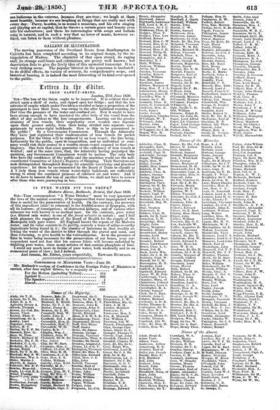IRON SAFETY-SHIPS. •
• ' _London, 27th June 1850.
Sin—The loss of the Orion ought to be improved. It is evident that she struck upon a shelf of rocks, and ripped open her bildge ; and that the few Minutes of respite which under Providence enabled so large a proportion of the passengers to save their lives, was owing to the after bulkhead resisting for that time the pressure of the water anduIonfined air. Now it ought to have been strong enough to have insulated the after body of the vessel from the effect ofanytieeident to ttlie fors nerapartments. . Leaving out the greater economy of iron vessels, their superiority over wooden ones depends upon their greater safety, from their being divided into separate com- partments by water-tight bulkheads. How is this to be guaranteed to WU public ? By a GOvernment,CommiSsMn. Through the Admiralty they have just registered their ebndenmation of iron vessels for packet purposes. Yet the Orion will Ire rapliced by an iron vessel ; the line being, fortunately for the public, open-la competition and no individual or com- pany would risk then money in a wooden steal-vessel exposed to that con- twirricy. One feels that some guarantee of the sufficiency of iron vessels is wanted ; and at the same time, that, the Admiralty having prejudged the question, anY•Government'Coniniaision would- be useless. The only body Who have the confidence of the- public and the maritime world are the self- constituted Committee of Lloyd's Registry Of Shipping. Their Surveyors are meta 'distinguished throughout Europe for scientific knowledge and practical experience : let them be recoinmended by-the Board of Trade, to classify as A 1 only those iron vessels who* water-tight bulkheads are sufficiently atTong to stand the combined pressure of .confined air and water. And if we do have to lament the lose of another Orion, we shall not have to sorrow after those who were journeying in her. MvaCATOR.


























 Previous page
Previous page